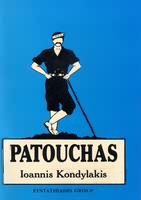Books and Good Reading
Title:
PATOUCHAS. Author: Ioannis Kondylakis. Patouchas is the nickname given to a Manolis, a half-wild lad who ran away from a traditional Cretan village because he was beaten at school. He lived happily in the mountains with the animals until he had a severe attack of hormones and realised there may possibly be more to life than just sheep. Unfortunately for Patouchas, fitting back into village life is fraught with terrible problems. He is totally ignorant of the social and traditional niceties that form the intricate web of normal life and when he falls madly in love at first sight with Pighi, his passion is unrestrained and he goes so far as to try and abduct her! At that time, of course, courtship and marriage was very structured – there had first to be the agreement between the parents that their children might become engaged and then marry, during which time the young people could not be alone together. Then there was the engagement ceremony when the priest gives his blessing to the couple – after which the couple could be seen together by the rest of the community; finally there was the marriage itself, after which the young people could be together as man and wife. There were also things such as dowries to be agreed, and a house to be built. Poor Patouchas has a lot to learn, and when Marghi, a more sophisticated girl with city ways returns to the village, he turns his attentions to her. She will have none of it, despite her widowed mother’s encouragement, as she has fallen for someone else, but the more Patouchas pursues her, the more firmly she rejects him. Marghi’s mother, Zervodopoula, becomes besotted with Patouchas and encourages him to kidnap Marghi – changing places with her daughter at the last minute. It’s a bit like an opera, isn’t it? So does Patouchas find a happy ending, or does he return to the mountains? Will Zervodopoula’s middle-aged fantasy come to anything? And what about poor old Pighi? You surely didn’t think I was going to tell you the ending did you? Reviewer: Ann Lisney. |
